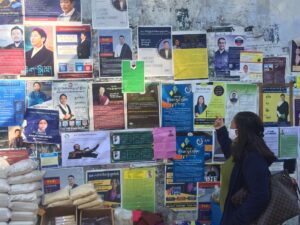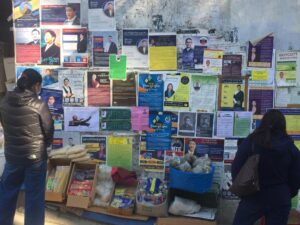
Campaign posters of candidates of Sikyong and Parliament members
Photo: Tenzin Samten / Contact
While the world is fighting the Covid-19 pandemic, Tibetans living in exile are busy preparing for their general election 2021 for the post of the Sikyong (President) and members of 17th Tibetan Parliament-in-exile, or Central Tibetan Administration.
Over 130,000 Tibetans living in exile in India and across the world will cast their vote in the first round, or preliminary election, on January 3 for both the members of the 17th Tibetan Parliament-in-exile and the Sikyong; the second and final round will be held on April 11.
Over 80,000 Tibetans across the globe have registered to vote. The Election Commission, however, has extended the registration deadline to enable more people to register, stating that the number of registered voters is far fewer than the general election held in 2016. “As per the request from several regional commissions, we have given an additional five days from December 23 to 28 for the registration” said Mr Wangdue Tsering, the Chief Election Commissioner. He also added that due to the Covid-19 pandemic there are obstructions to carrying out the election process smoothly, but his regional election commissions are determined to facilitate voting for every Tibetan in this election.
There are seven candidates running for the post of Sikyong and many others, including youngsters, running for members of Tibetan Parliament-in- Exile. The candidates are busy campaigning for themselves; most of them are using social media platforms to reach out to voters while some are going from place to place to meet voters directly. “Our campaigning is going good considering the restrains that we are under because of Covid” said one candidate for the Parliament-in-Exile, Namgyal Dolkar. While the campaign slogans revolve around truth, unity, education and patriotism, there were critics over candidates’ lack of discussion on core issues of the Tibetan struggle, including the re-establishment of dialogue between representatives of His Holiness Dalai Lama and the Chinese Communist Party.

Photo: Tenzin Samten / Contact
Democracy in Tibetan exile society has come a long way since its first election in 1960. It has now developed into a unique democratic system which has no political parties to compete for the highest seats. Members of the Tibetan Parliament in Exile comprise ten representatives from each of the traditional provinces of Tibetan – U-Tsang, Dhotoe and Dhomey; two from each of the four schools of Tibetan Buddhism and the pre-Buddhist Bon religion; two representing each of the Tibetan communities in North America and Europe and one from Australasia and Asia. The Sikyong is elected directly by the Tibetan community, based on a popular vote.
For more about the election click here




 Print
Print Email
Email